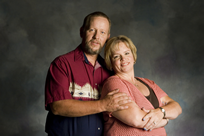|
 On May 18, 2005, Lori Clayson suffered a stroke. Lori was working at a convenience store and just thought she was tired. But, as she was handling a few transactions, she could not ring up the merchandise. She could think of what she wanted to do but no actions followed. After this went on for a little while, she finally called her husband to come and get her. After Lori scrambled to get her shift covered they made a stop to see if someone they knew could help; finally, they went to the hospital where she received treatment just 12 minutes before the window of opportunity for treatment closed. Lori has made a great recovery. She still has some memory loss and weakness in her arm, but can ride her horse, play with her grandkids, and garden. “Don't second guess yourself and don't let time get down to the wire,” she advises. On May 18, 2005, Lori Clayson suffered a stroke. Lori was working at a convenience store and just thought she was tired. But, as she was handling a few transactions, she could not ring up the merchandise. She could think of what she wanted to do but no actions followed. After this went on for a little while, she finally called her husband to come and get her. After Lori scrambled to get her shift covered they made a stop to see if someone they knew could help; finally, they went to the hospital where she received treatment just 12 minutes before the window of opportunity for treatment closed. Lori has made a great recovery. She still has some memory loss and weakness in her arm, but can ride her horse, play with her grandkids, and garden. “Don't second guess yourself and don't let time get down to the wire,” she advises.
|